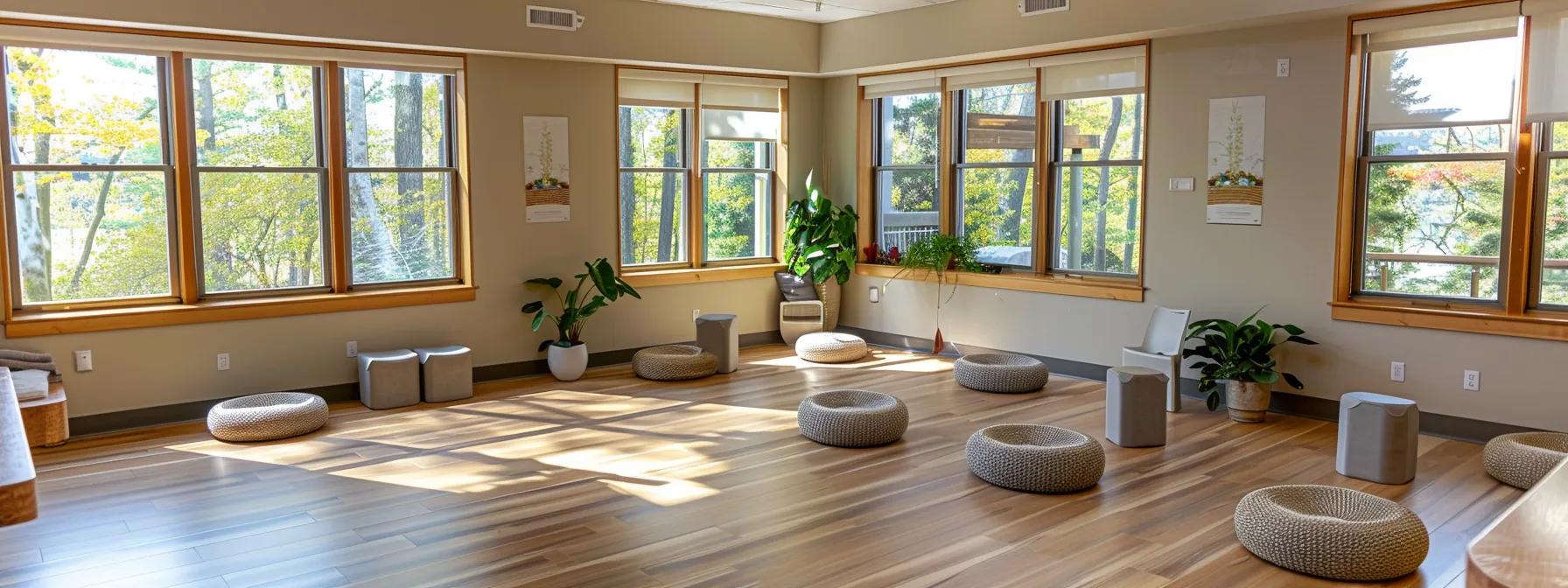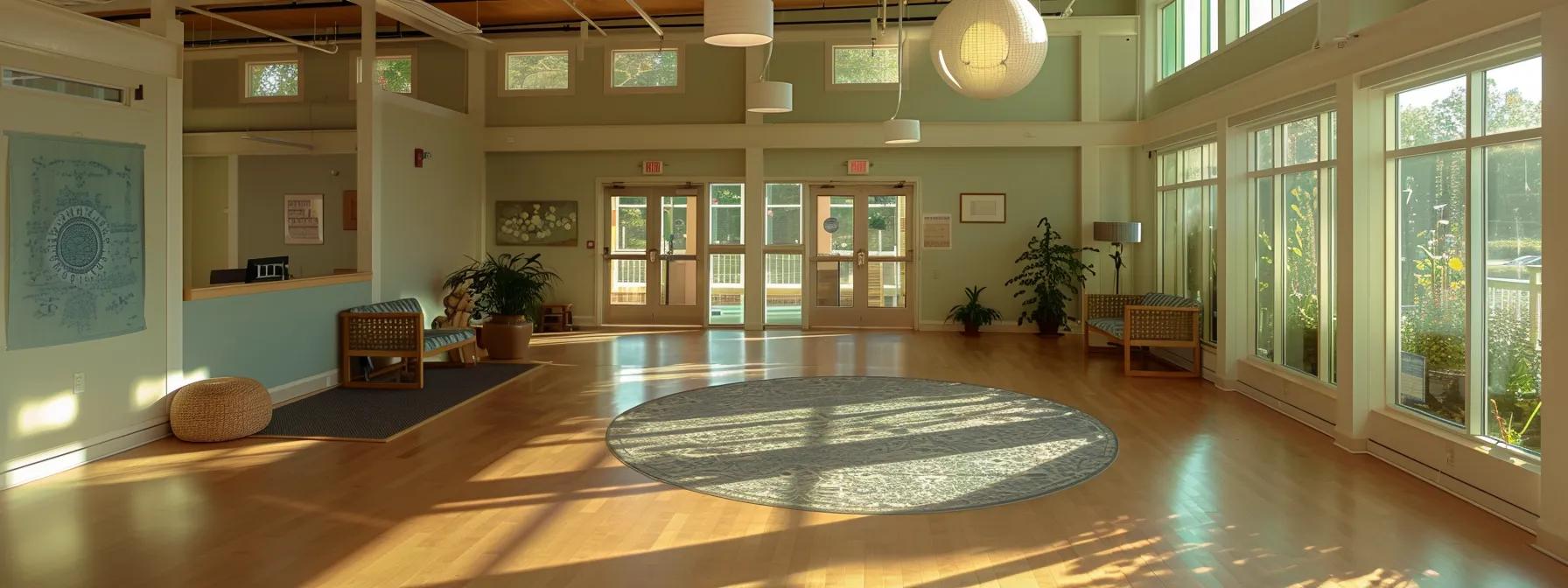Table Of Contents:
- Exploring the Differences: Half Day IOP vs. Full-Day Treatment Programs in Massachusetts
- Defining Half Day IOP in MA and Full Day Treatment Program Structures
- How Does Half Day IOP in MA Compare to Full Day Treatment Programs in Daily Commitment
- Contrasting Treatment Intensity and Therapeutic Services in MA Programs
- Ideal Candidates for Half Day IOP Versus Full Day Treatment in Massachusetts
- Examining the Living Arrangements and Environment for MA Treatment Options
- Navigating the Choice Between Half Day IOP and Full Day Treatment in Massachusetts
- Detailed Lists of Key Considerations in Treatment Program Selection
- Tables of Comparative Data
- Frequently Asked Questions
Exploring the Differences: Half Day IOP vs. Full-Day Treatment Programs in Massachusetts
An effective treatment plan for substance abuse and mental health challenges is critical for long-term recovery. In Massachusetts, treatment options such as the Half Day Intensive Outpatient Program (IOP) and Full-Day Treatment Programs are two common approaches offered at facilities like Strength Recovery Center. Although both models offer structured therapeutic support, they differ in time commitment, treatment intensity, and suitability for various patient profiles. This article explains these differences to help families, individuals, and healthcare professionals choose a program that aligns with personal recovery goals and external responsibilities.
Our discussion begins by defining each program type, comparing client profiles, daily commitments, treatment intensities, and living arrangements. In doing so, we rely on real-life examples, data analyses, and clear comparisons that support evidence-based treatment practices while fulfilling the mission of Strength Recovery Center.
Transitioning from an overview of program differences to an analysis of treatment structures, the sections below break down each aspect to aid in informed decision-making.
Defining Half Day IOP in MA and Full Day Treatment Program Structures
In Massachusetts, Half Day Intensive Outpatient Programs (IOP) and Full-Day Treatment Programs differ considerably in structure and daily commitment. Half Day IOPs are designed to provide substantial clinical support while allowing patients to continue external responsibilities such as work, school, or family life. These programs operate during daytime hours, typically offering sessions that last a few hours, thus affording flexibility for those with stable support systems or living environments.
By contrast, Full Day Treatment Programs—often referred to as Partial Hospitalization Programs (PHP)—offer a more immersive, all-day therapeutic experience. Clients in full-day settings are engaged in a variety of interventions including individual therapy, group sessions, skill-building exercises, and medical oversight. These programs are intended to address severe addiction patterns, co-occurring disorders, and other complex mental health issues through more frequent and intensive interactions.
The core difference lies in the reception and intensity of therapy: Half Day IOPs suit individuals with stable home environments who can manage outpatient care alongside daily life, while Full Day Programs provide the rigorous support required by those needing constant clinical intervention.
What Characterizes a Half Day Intensive Outpatient Program in Massachusetts
A typical Half Day IOP in Massachusetts features flexible session formats and partial-day treatment. At centers like Strength Recovery Center, these programs usually offer sessions lasting three to five hours per day, several days per week. Components include group therapy, individual counseling, and educational sessions covering relapse prevention, coping mechanisms, and behavioral modifications. This structure allows patients to attend sessions in the morning or afternoon and then resume normal activities afterward.
This model is ideal for those transitioning from a higher level of care or maintaining work or educational commitments. Its flexibility also supports family involvement and peer support, both key for long-term recovery. With a set schedule and clear treatment milestones, patients work toward reducing relapse risks and building independence. Studies have shown that consistent engagement in Half Day IOPs can improve coping skills and reduce relapse rates by a significant margin.
Understanding the Framework of Full Day Treatment Programs in MA
Full Day Treatment Programs in Massachusetts are structured for an immersive experience lasting up to eight hours per day. Recognized for their intensity, these programs incorporate a range of services including individual and group therapy, skill-building workshops, psychoeducation, mindfulness sessions, physical wellness activities, nutritional counseling, and sometimes medication management.
Such programs provide a medically managed environment that minimizes exposure to triggers and distractions. The immersive setting promotes rapid skill development and coordinated treatment of underlying issues related to substance abuse and mental health conditions. Frequent check-ins and evaluations by clinical staff ensure that patients receive personalized adjustments throughout their recovery journey.
Full Day Programs are particularly beneficial for individuals with severe addiction, co-occurring disorders, or unstable living situations. Their comprehensive nature is intended for patients who need constant therapeutic support to maintain recovery momentum.
Core Objectives of Half Day IOP Versus Full Day Treatment in Massachusetts
The objectives of these treatment models differ in intervention depth and support scope. Half Day IOPs focus on reintegrating patients into daily life by teaching coping strategies and reinforcing healthy behaviors while allowing continued participation in work and family activities. The goal is to sustain recovery through moderate clinical contact combined with independent living.
In contrast, Full Day Treatment Programs are designed for immediate stabilization and intensive intervention. Their primary aim is to reverse acute decompensation in mental health and substance abuse by providing all-day, coordinated care. These programs seek to achieve quick recovery milestones through rigorous and frequent therapeutic engagement.
Both models aim to reduce relapse risks and improve overall functioning; however, the degree of immersion distinguishes them. Half Day IOPs are best for those with strong external support, whereas Full Day Programs are tailored for patients needing comprehensive, immersive treatment.
Typical Client Profiles for Each Program Type in MA
Client profiles differ notably between the two models. Individuals in Half Day IOPs generally exhibit relative stability outside of their addiction challenges—they are often employed or enrolled in school and have supportive family structures. They are typically in a recovery phase that benefits from reinforcing behavioral changes and managing stress without significant disruption to daily life.
Conversely, Full Day Treatment Program clients are usually those requiring intensive oversight. They may have long-standing substance abuse issues, serious co-occurring mental health disorders, or multiple relapses. For these individuals, the immersive nature of full-day programs fosters rapid stabilization and skill acquisition. Such patients often experience unstable personal environments that benefit from the constant structure and comprehensive clinical services offered by Full Day Programs.
How Does Half Day IOP in MA Compare to Full Day Treatment Programs in Daily Commitment

Daily commitment is a critical factor when determining the appropriate treatment approach. Half Day IOPs in Massachusetts require patients to devote only a portion of the day—typically three to five hours—to treatment. This model suits individuals who can balance therapy with work, school, or family obligations. The flexible scheduling supports ongoing engagement with external responsibilities while providing necessary clinical support.
Full Day Treatment Programs, however, demand nearly full-day commitment, with patients spending up to eight hours or more in therapeutic activities. This immersive approach removes clients from their usual environments, reducing external distractions and allowing them to focus exclusively on recovery. The continuous availability of clinical staff and a tightly structured schedule enable rapid progress in treatment and immediate crisis intervention if needed.
Time Investment for Half Day IOP Sessions in Massachusetts
Sessions in a Half Day IOP generally last between three and five hours per day, several days a week. Patients benefit from a schedule that integrates therapy without disrupting work or family activities. The structured sessions—comprising group therapy, individual counseling, and psychoeducational classes—help reinforce sobriety and build coping skills. The moderate time commitment allows patients to maintain autonomy and gradually integrate recovery practices into daily life. Periodic reassessments by clinical staff ensure that treatment plans evolve alongside patient progress.
The Schedule Demands of Full Day Treatment Programs in MA
Full Day Treatment Programs require a higher level of daily participation. Patients typically follow a rigorous schedule starting early in the morning and extending into the late afternoon. These programs include multiple therapy sessions, educational workshops, and ancillary activities, all designed to ensure continuous care. While the demanding schedule may challenge those with significant external obligations, it is essential for individuals with severe addiction or mental health disorders who require immersive support. The structured day minimizes distractions and maximizes therapeutic outcomes through regular monitoring and prompt crisis intervention.
Flexibility Offered by Half Day IOP in Massachusetts for External Responsibilities
One of the greatest advantages of Half Day IOPs is the flexibility they offer. Patients who work, study, or manage family responsibilities appreciate having treatment sessions that do not completely disrupt their daily routines. This flexibility helps maintain social connections and external support systems, which are vital for long-lasting recovery. Additionally, adaptable session scheduling ensures that patients can manage variable work hours, school timetables, or caregiving demands while still engaging fully in their recovery program.
Immersion Levels in Full Day Massachusetts Treatment Settings
Full Day Treatment Programs provide significantly higher levels of immersion than Half Day IOPs. Clients spend most of the day in a controlled clinical setting where therapeutic interventions are continuous. This immersive environment minimizes the distractions of home or work and is especially beneficial for patients prone to triggers. The constant contact with professional staff, combined with structured group activities and individualized therapy, facilitates rapid stabilization and deep engagement in the recovery process. The immersive setting also allows for real-time treatment adjustments to meet the changing needs of patients.
Contrasting Treatment Intensity and Therapeutic Services in MA Programs
Treatment intensity and the range of services are essential factors that differentiate the two models. In Half Day IOPs, treatment intensity is moderate. Patients receive structured therapy—such as cognitive behavioral therapy (CBT), group sessions, and psychoeducation—but the number of therapeutic hours per week is lower compared to Full Day Programs. This model strikes a balance between clinical intervention and maintaining daily responsibilities.
Full Day Treatment Programs, on the other hand, offer high-intensity care with 30 to 40 therapeutic hours per week on average. Services extend beyond traditional therapy to include trauma-focused interventions, nutritional counseling, mindfulness training, and family therapy. The extended daily schedule facilitates a more in-depth exploration of underlying issues and promotes rapid stabilization. This heightened intensity is particularly beneficial for individuals with severe addiction or complex mental health challenges.
Therapeutic Hours Per Week in Half Day IOP in MA
Typically, Half Day IOPs provide between 15 and 20 therapeutic hours each week. Sessions are a mix of group therapy, individual consultations, and educational workshops designed to equip clients with tools to handle stress, triggers, and maintain sobriety. This moderate level of engagement supports gradual behavioral change, allowing patients to safely transition from more intensive care environments while preserving essential daily responsibilities.
Service Intensity Within Full Day Treatment Programs in Massachusetts
In Full Day Treatment Programs, patients can expect 30 to 40 therapeutic hours per week. The program’s high intensity is evident in its continuous, multi-layered schedule, which includes individual and group therapy, skill-building sessions, and medical supervision. The concentrated schedule is designed to help patients rapidly stabilize and acquire crucial coping strategies, with the overall goal of reducing relapse incidence. This comprehensive approach is particularly effective for those with complex clinical needs.
Types of Therapies Common in Massachusetts Half Day IOP
Half Day IOPs in Massachusetts utilize several therapeutic modalities to address addiction and mental health challenges. Common therapies include: 1. Cognitive Behavioral Therapy (CBT) for restructuring maladaptive thought patterns. 2. Dialectical Behavioral Therapy (DBT) combined with mindfulness to improve emotional regulation. 3. Group Therapy to provide peer support and shared recovery experiences. 4. Psychoeducational Sessions focused on addiction, stress management, and relapse prevention. 5. Motivational Interviewing to deepen personal commitment to recovery. 6. Family Therapy to involve loved ones in the recovery process. 7. Mindfulness and Relaxation Techniques to manage stress and anxiety.
Each therapy session typically lasts 45–60 minutes, with the integrated approach ensuring a balanced treatment addressing cognitive, emotional, and social aspects.
Comprehensive Care Components of MA Full Day Treatment
Full Day Treatment Programs enhance their therapeutic sessions with comprehensive care components: 1. Medical Oversight to provide immediate intervention if necessary. 2. Psychiatric Evaluation for managing dual diagnoses. 3. Nutritional Counseling to support physical rehabilitation. 4. Physical Fitness Programs to improve overall well-being. 5. Relapse Prevention Planning aimed at minimizing future risk. 6. Aftercare Preparation to facilitate smooth reintegration post-treatment. 7. Holistic Therapies, such as art or music therapy, encouraging emotional balance.
These additional services are integrated into the daily schedule, ensuring that every aspect of recovery is addressed within a supportive, structured environment.
Ideal Candidates for Half Day IOP Versus Full Day Treatment in Massachusetts

Choosing between a Half Day IOP and a Full Day Treatment Program largely depends on the patient’s level of stability and external commitments. Ideal candidates for Half Day IOPs are those who have achieved a degree of stability in their personal lives. These individuals typically have steady employment or educational roles and a supportive home environment that allows them to integrate treatment into their daily routines. They benefit from the flexibility of outpatient care while reinforcing behavioral changes and relapse prevention strategies.
In contrast, Full Day Treatment is best suited for patients with more severe clinical symptoms, multiple relapses, or insufficient external support. These individuals often exhibit significant impairments in daily functioning and require a highly structured environment to achieve rapid stabilization. The immersive nature of Full Day Programs is designed for those who need continuous therapeutic supervision and a comprehensive approach to address both addiction and co-occurring disorders.
Assessing Stability for Effective Half Day IOP Participation in MA
Effective participation in a Half Day IOP requires stability in several areas, including steady employment, financial security, and a supportive home environment. Patients who meet these criteria are more likely to integrate treatment lessons into daily routines and achieve long-term recovery. Research indicates that stable external conditions significantly contribute to successful outcomes by facilitating continuity of care beyond the clinical setting.
When a Full Day Program Offers Necessary Support in Massachusetts
Full Day Treatment Programs are especially beneficial for patients undergoing acute crises or those who have experienced significant disruptions in their personal and professional lives due to substance abuse. Clients with severe addiction, unmanaged co-occurring disorders, or unstable living conditions often require the intensive, immersive care offered by full-day programs. These settings ensure constant clinical supervision and comprehensive support, enabling rapid stabilization and immediate crisis intervention.
Support System Requirements for Half Day IOP Success in MA
A strong support system is essential for patients in Half Day IOPs. Since these programs allow individuals to return to their usual environments after treatment sessions, the presence of supportive family members or friends is crucial. A stable home environment coupled with peer support groups enhances the continuity of care and reinforces recovery outside the clinic.
Circumstances Favoring the Structure of Full Day Treatment in Massachusetts
Certain circumstances make Full Day Treatment Programs the preferable option. Patients experiencing acute withdrawal symptoms, significant relapses, or lacking a stable home environment may benefit more from the immersive and structured setting of full-day programs. Additionally, those with severe co-occurring mental health conditions, such as depression or anxiety, often require the constant clinical oversight and intensive intervention provided by Full Day Programs.
Examining the Living Arrangements and Environment for MA Treatment Options
Living arrangements and environmental factors play a vital role in recovery outcomes. For Half Day IOP clients, a stable home life reinforces the benefits of outpatient care. A quiet, supportive living environment allows patients to practice therapeutic strategies, maintain routines, and benefit from family support. Many treatment centers emphasize the importance of a safe, substance-free home as a foundation for long-term sobriety.
On the other hand, Full Day Treatment Programs often incorporate structured living arrangements, such as sober living houses or transitional residences. These environments are designed to minimize exposure to triggers through constant supervision, set routines, and integrated support from on-site staff. Such settings provide a holistic support network that further enhances treatment efficacy.
Maintaining Home Life During Half Day IOP in Massachusetts
For patients in Half Day IOPs, maintaining a balanced home life is critical. A stable home supports recovery by allowing individuals to practice coping mechanisms learned in therapy. Regular participation in family meals, discussions, and domestic routines reinforces the therapeutic process and helps sustain sobriety.
Housing Considerations for Full Day Treatment Participants in MA
Patients in Full Day Treatment Programs often benefit from structured housing solutions offered by treatment centers. These arrangements provide a secure, regulated living environment that reduces distractions and reinforces the intensive daily schedule. Features commonly include strict substance-free policies, scheduled quiet hours, and regular check-ins by clinical staff, all of which contribute to enhancing recovery outcomes.
The Role of a Supportive Home Environment for MA Half Day IOP
A supportive home environment is crucial for the success of Half Day IOPs. When families and roommates create a substance-free and encouraging atmosphere, patients are better able to integrate the skills acquired in therapy. Family counseling sessions may also be held to educate loved ones, ensuring that the home environment continues to support the recovery process.
Structured Environments in Massachusetts Full Day Programs
Structured environments in Full Day Treatment Programs are designed to eliminate potential triggers by maintaining rigid daily schedules and clear clinical rules. In these environments, every aspect of the day—from therapy sessions to leisure activities—is engineered to reinforce recovery. Research shows that such structured settings result in higher treatment adherence and lower relapse rates, underscoring their importance for patients with severe addiction challenges.
Navigating the Choice Between Half Day IOP and Full Day Treatment in Massachusetts

Selecting the right treatment option in Massachusetts requires a thorough evaluation of treatment intensity, time commitment, and external stability. Providers like Strength Recovery Center offer personalized consultations to help evaluate clinical needs, lifestyle demands, and financial considerations. Ultimately, the decision is guided by matching the intensity of therapy to the patient‘s condition and available support systems.
Key Questions to Evaluate Half Day IOP Providers in MA
When choosing a Half Day IOP provider, consider asking: 1. What is the duration and frequency of treatment sessions? 2. How are therapies like CBT, DBT, or group sessions integrated? 3. Is there flexibility in scheduling to accommodate external responsibilities? 4. What is the staff-to-patient ratio for individualized care? 5. How is family involvement and aftercare support addressed? 6. How is progress measured and treatment plans adjusted? 7. What financial options or insurance plans are accepted?
These questions help ensure that the chosen program can effectively support recovery without disrupting daily life.
What to Ask About Full Day Treatment Programs in Massachusetts
For Full Day Treatment Programs, consider asking: 1. How many therapeutic hours per week are provided and how are they distributed? 2. What additional support services (e.g., nutritional counseling, holistic therapies) are offered? 3. How are medical and psychiatric needs managed? 4. What does the daily schedule look like, including group and individual sessions? 5. Are there on-site housing or structured living arrangements available? 6. What protocols exist for crisis intervention and continuous supervision? 7. What evidence is available regarding both short- and long-term outcomes?
These inquiries help clarify the full scope of support provided in an immersive treatment setting.
Financial Aspects of Half Day IOP vs. Full Day Treatment in MA
Financial considerations vary significantly between the two models. Half Day IOPs usually incur lower costs due to fewer therapy hours and no required structured housing. In contrast, Full Day Treatment Programs generally have higher expenses because of their extended daily schedule, comprehensive services, and potential housing arrangements. Prospective patients should inquire about fee schedules, insurance coverage, and available payment plans to ensure that the chosen option aligns with both clinical needs and financial realities.
Aligning Program Choice With Personal Recovery Goals in Massachusetts
Ultimately, selecting between Half Day IOP and Full Day Treatment Programs should be based on personal recovery objectives. Individuals who wish to reintegrate gradually into daily life while maintaining employment or school commitments may find that Half Day IOP is the optimal choice. Conversely, those needing intensive intervention due to severe addiction or significant mental health disorders might benefit more from the immersive structure of Full Day Treatment. It is essential to assess short- and long-term recovery goals—such as achieving stability, reducing relapse risks, and improving mental health—and choose the program that best supports these objectives.
Detailed Lists of Key Considerations in Treatment Program Selection
Below are several lists summarizing critical factors for choosing between Half Day IOP and Full Day Treatment Programs in Massachusetts.
List 1: Advantages of Half Day IOP Programs
- Flexible scheduling that accommodates work and family commitments.
- Moderate therapeutic engagement that supports recovery without overwhelming daily routines.
- Integration of group and individual counseling for balanced treatment.
- Facilitates a gradual transition from residential care to independent living.
- Encourages incorporation of new coping mechanisms in everyday life.
- Enhances family involvement and external support systems.
- Generally lower overall treatment costs.
List 2: Key Benefits of Full Day Treatment Programs
- Immersive therapeutic environment that minimizes external triggers.
- Comprehensive services including medical, psychiatric, and holistic care.
- Suitable for severe addiction or multiple, co-occurring disorders.
- High number of therapeutic hours accelerates stabilization.
- Rigid daily structure enhances adherence to treatment.
- Often includes on-site housing and continuous clinical supervision.
- Enables rapid progress through intensive, coordinated care.
List 3: Questions to Evaluate Treatment Providers (General)
- What is the structure and frequency of therapy sessions?
- How flexible is the scheduling for external obligations?
- What clinical success rates does the program report?
- How are co-occurring disorders managed?
- What additional support services are offered?
- How is family or community support integrated?
- What financial terms, including insurance and payment options, apply?
List 4: Living Arrangement Considerations for Treatment Success
- A stable home environment reinforces recovery outside sessions.
- Structured housing in Full Day Programs minimizes exposure to triggers.
- Proximity to treatment facilities reduces logistical challenges.
- A supportive family environment enhances therapeutic progress.
- On-site supervision provides continuous encouragement.
- Peer interaction in communal settings facilitates mutual accountability.
- Regular assessments of living arrangements help maintain treatment effectiveness.
Tables of Comparative Data
Below is a table comparing key attributes of Half Day IOP and Full Day Treatment Programs:
Table 1: Key Comparative Attributes of MA Treatment Programs
| Attribute | Half Day IOP | Full Day Treatment |
|---|---|---|
| Daily Hours of Treatment | 3–5 hours | 8+ hours |
| Therapeutic Hours per Week | 15–20 hours | 30–40 hours |
| Flexibility for External Duties | High | Low |
| Immersive Environment | Moderately immersive | Highly immersive |
| Housing Requirement | Not required | Often included |
| Cost Comparison | Relatively lower | Relatively higher |
| Ideal Candidate Profile | Stable home | Severe/unstable conditions |
Table 2: Therapy Modalities Offered
| Therapy Type | Half Day IOP | Full Day Treatment |
|---|---|---|
| Cognitive Behavioral Therapy | Yes | Yes |
| Group Therapy | Yes | Yes |
| Individual Counseling | Yes | Yes |
| Family Therapy | Available | Intensive and integrated |
| Nutritional Counseling | Limited | Comprehensive |
| Holistic Therapies | Optional | Routinely included |
| Medication-Assisted Treatment | Available | Intensively monitored |
Table 3: Patient Suitability and Support Needs
| Factor | Half Day IOP Suitability | Full Day Treatment Suitability |
|---|---|---|
| Home Life Stability | High – essential | Low – structured housing needed |
| External Responsibilities | Can manage work/school | Typically suspended |
| Severity of Addiction | Moderate | Severe |
| Co-occurring Disorders | Manageable outpatient | Require intensive oversight |
| Readiness for Immersion | Gradual rehabilitation | Immediate comprehensive care |
| Financial Investment | Lower cost | Higher cost |
| Support System Contribution | Family/peer vital | On-site and integrated support |
Each table summarizes key differences, emphasizing that treatment choice should depend on individual recovery needs, stability, and overall clinical presentation.
Frequently Asked Questions
Q: What are the main differences between Half Day IOP and Full Day Treatment Programs in Massachusetts?
A: The primary differences include the daily time commitment, treatment intensity, and living arrangements. Half Day IOP programs offer 3–5 hours of therapy per day, enabling clients to maintain work or family commitments, while Full Day Treatment Programs provide an immersive, all-day schedule with more intensive services and structured housing—ideal for patients with severe symptoms.
Q: How do the therapeutic outcomes compare between the two treatment models?
A: Outcomes vary based on individual needs. Half Day IOPs tend to support gradual progress and reduced relapse rates by integrating therapeutic tools into daily life. In contrast, Full Day Treatment Programs often yield rapid stabilization, particularly for patients with severe addiction or complex mental health issues, when treatment intensity is closely matched to clinical needs.
Q: Can my insurance cover either of these treatment programs in Massachusetts?
A: Many insurance plans, including Medicaid and private insurers, cover both program types. However, details vary; Full Day Treatment Programs may have higher co-pays due to increased intensity, while Half Day IOPs generally offer lower overall costs. It is important to check with your insurance provider and consult with the treatment center’s financial counselors for specifics.
Q: What factors should I consider when choosing between these two treatment options?
A: Consider the severity of the addiction, the stability of your home environment, your external responsibilities, and the level of clinical support required. Half Day IOPs are typically suited to individuals who can maintain their daily routines, whereas Full Day Programs are designed for those needing intensive, immersive care.
Q: How do living arrangements impact recovery in these programs?
A: Living arrangements are crucial. A stable and supportive home environment reinforces recovery for Half Day IOP clients, while Full Day Treatment Programs often provide structured, on-site housing to minimize distractions and triggers, thereby enhancing treatment adherence and outcomes.
Q: How is family involvement integrated into these treatment programs?
A: Both models emphasize family involvement. In Half Day IOPs, family therapy and educational workshops help family members support recovery at home. Full Day Programs typically incorporate more intensive family counseling to rebuild trust and promote cohesiveness within the family unit.
Q: What support is available after completing these treatment programs?
A: Post-treatment support is essential for sustained recovery. Graduates of Half Day IOPs often transition into outpatient and community support groups, while Full Day Treatment Program alumni may participate in structured aftercare programs that include continued therapy, support groups, and regular follow-up assessments, ensuring ongoing recovery support.



